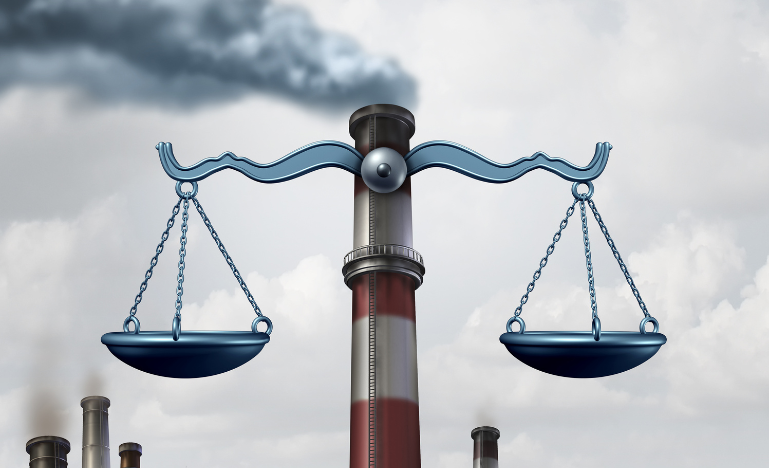Peut-on faire payer les pétrolières comme les cigarettiers?
Le camp qui veut voir l’industrie des combustibles fossiles payer est encouragé par une proposition des géants du tabac de verser des milliards en indemnités aux provinces et territoires et aux fumeurs

Les factures arrivent à échéance. Au cours des 15 dernières années, le coût annuel des réclamations d’assurance liées à des phénomènes météorologiques extrêmes au Canada a frôlé les 2 milliards de dollars. Une nette hausse par rapport aux 250 à 400 millions de dollars enregistrés de 1983 à 2008.
Dans un rapport de 2022, l’Institut climatique du Canada prévenait le pays que les catastrophes naturelles coûteraient annuellement 17 milliards d’ici 2050. En 2023, la Colombie-Britannique a dépensé au moins 770 millions pour la lutte contre les feux de forêt, après avoir connu la pire saison de son histoire (jusqu’à maintenant). En Alberta, la facture des inondations et des feux de forêt pour l’exercice 2023-2024 se chiffrait à 2,9 milliards de dollars.
Les gouvernements ne sont pas les seuls à essuyer des frais, d’ailleurs. Les phénomènes météorologiques extrêmes, dont l’intensité et la fréquence augmentent avec les changements climatiques, ont contribué à une hausse moyenne de 7,7 % des primes d’assurance habitation à l’échelle nationale cette année.
Les changements climatiques menacent d’appauvrir à peu près tout le monde. Naturellement, certains gouvernements et particuliers se tournent vers les tribunaux pour forcer les entreprises de combustibles fossiles à mettre la main au portefeuille. Et ils viennent d’obtenir un encouragement valant des milliards de dollars.
En octobre, un médiateur a déposé devant un tribunal de l’Ontario une proposition (en anglais seulement) qui amènerait trois géants du tabac à verser 24 milliards de dollars aux provinces et territoires à titre d’indemnisation partielle pour le traitement des maladies liées au tabagisme, et plus de 4 milliards à des dizaines de milliers de fumeurs québécois et leurs héritiers.
Au Canada, la première poursuite visant à récupérer les coûts des soins de santé liés au tabagisme a été intentée en Colombie-Britannique en 1998, après quoi presque tous les territoires et toutes les provinces ont vite emboîté le pas. La Colombie-Britannique a fondé ses revendications sur une nouvelle loi provinciale, la Tobacco Damages and Health Care Costs Recovery Act. Cette loi créait un recours direct contre les fabricants de produits du tabac pour que puissent être récupérés rétroactivement les frais de soins de santé engendrés par la consommation de ces produits, sur la base de données statistiques et épidémiologiques permettant d’établir la causalité selon la part de marché de l’entreprise.
La loi – jugée constitutionnelle par la Cour suprême du Canada en 2005 – a ainsi corrigé ce que Martin Olszynski et ses deux collègues universitaires décrivaient dans un article de 2018 (en anglais seulement) comme une « faille » en ce qui concerne la causalité : elle a permis aux provinces et territoires d’utiliser des données pour prouver, par agrégation, que l’exposition à la cigarette entraînait la maladie chez n’importe quelle population. Elle a aussi évité à la province d’avoir à prouver que les Britanno-Colombiens étaient tombés malades en raison des actions posées par les géants du tabac à l’intérieur de ses frontières.
Selon Me Olszynski, professeur agrégé à la Faculté de droit de l’Université de Calgary, et d’autres spécialistes du droit, ce qui a fonctionné dans le cas du tabac pourrait également fonctionner dans le cas du climat. Plus précisément, l’adoption de lois provinciales et fédérales suivant le modèle de la Tobacco Damages and Health Care Costs Recovery Act pourrait aider les gouvernements à poursuivre les entreprises de combustibles fossiles afin de récupérer les coûts d’adaptation aux changements climatiques et de réparation des infrastructures.
« La législation accélère le processus de responsabilisation », affirme Me Olszynski, ajoutant que la pression subie par les gouvernements pour récupérer les fonds dépensés en atténuation des changements climatiques et en rétablissement après catastrophe ne fera que s’accroître à mesure que ces coûts grimperont.
« En ce qui a trait aux changements climatiques, nous sommes sans contredit confrontés à l’inévitable depuis une dizaine d’années. Et nous venons d’entrer dans la phase où le coût des catastrophes liées à ces changements est évident pour tout le monde, partout. »
Des lois encadrant la récupération des coûts de réparation et d’adaptation pourraient s’appuyer sur les précédents et accélérer les démarches de recours collectif. Ainsi, des poursuites pourraient être autorisées pour délit de nuisance privée ou publique, pour défaut de mise en garde, pour complot ou en responsabilité stricte.
Cependant, ces projets de loi seraient vulnérables face aux aléas de la politique, nuance Camille Cameron, qui étudie le droit des actions collectives et les litiges climatiques à la Schulich School of Law de l’Université Dalhousie.
« L’avantage de cette législation, c’est que, si elle survit aux contestations judiciaires, elle pourra définir la causalité et la répartition dans les recours collectifs. Et cela simplifierait les choses », poursuit-elle.
« Par contre, l’adoption d’une loi demande beaucoup de temps. Il y aurait des contestations jusqu’en Cour suprême. Et il faut tenir compte des caprices de la politique : les changements de gouvernement, l’évolution des priorités… »
À l’extérieur du Canada, les recours collectifs contre des entreprises de combustibles fossiles progressent sans cadre législatif particulier. On recensait au-delà de 2 000 litiges climatiques à l’échelle mondiale l’an dernier. Plus d’une vingtaine de villes et d’États américains poursuivent actuellement des pétrolières, alléguant que ces dernières connaissaient depuis des décennies les dangers associés à l’utilisation des combustibles fossiles et ont activement caché cette information aux consommateurs et aux investisseurs.
« Je crois beaucoup à l’action en justice », affirme Me Cameron.
« Aux États-Unis, beaucoup de causes avancent sans l’appui de lois. Ce serait plus facile s’il y en avait, mais ce n’est pas impossible sans elles. »
Au Canada, West Coast Environmental Law (WCEL) a lancé une campagne qui invite les municipalités à appuyer un recours collectif ciblant l’industrie des combustibles fossiles; jusqu’à présent, neuf municipalités ont répondu à l’appel.
« Comme ce type de cause est nouveau au Canada, il n’y a pas de jurisprudence portant précisément sur le sujet », souligne Andrew Gage, juriste à WCEL.
« La législation répondrait à certaines questions procédurales, mais nous croyons que le droit canadien offre tout de même des bases solides, particulièrement en matière de nuisance privée et publique. »
La campagne de WCEL arrive au moment où les pétrolières mesurent la portée de la nouvelle loi fédérale sur l’écoblanchiment (les fausses déclarations sur les effets environnementaux des produits).
« Cette expansion de la Loi sur la concurrence va entraîner une hausse du nombre d’actions collectives pour déclaration inexacte », prévoit Andrew Pozzobon, associé chez BLG, à Calgary, qui se spécialise dans le secteur de l’énergie et le litige commercial.
Selon lui, les entreprises de combustibles fossiles vont probablement réfuter les allégations de nuisance en arguant que les gouvernements provinciaux ont autorisé et réglementé leurs produits.
Matthew Huys, associé chez Osler se spécialisant aussi dans le litige commercial et le secteur de l’énergie, décrit la campagne de WCEL comme une approche innovante qui suit le modèle américain.
Pour cette raison, il est difficile de prédire la réponse des tribunaux canadiens.
« Je vois d’emblée certains problèmes, dont le fait qu’une obligation de diligence ne peut pas s’appliquer envers un groupe illimité de demandeurs », explique Me Huys, soulignant que les tribunaux canadiens ont par ailleurs montré des réticences à traiter ce qu’ils considèrent comme des décisions politiques dans le cadre d’une poursuite.
« À mesure que s’élargit le consensus scientifique sur les effets des changements climatiques, les tribunaux pourraient devenir moins réticents à se prononcer sur ces affaires. »
Bien sûr, il demeure une grande différence entre les cigarettiers et les pétrolières : le pétrole revêt une bien plus grande importance pour l’économie canadienne que le tabac à son âge d’or. Voilà qui lui donne davantage de poids politique et freine l’enthousiasme des gouvernements à l’idée d’une poursuite.
Mais selon Me Cameron, les poursuites ont le don de dissiper le brouillard politique qui voile si souvent les questions de responsabilité des entreprises. La preuve est déposée, les notes de service sont dévoilées, et la façon de l’industrie de traiter les dangers associés à ses produits est révélée au public.
« À mesure qu’on découvrira durant les interrogatoires préalables ce que ces entreprises savaient sur les effets de leurs produits sur le climat, et depuis quand, le débat public va se transformer », annonce-t-elle.
« Voilà qui pourrait pousser les gouvernements à agir. »
Et si la proposition de règlement n’empêche pas les cigarettiers de poursuivre leurs activités, Me Gage estime que la mauvaise presse les a forcés à modifier leurs façons de faire.
« L’industrie du tabac concentre au moins une partie de ses activités actuelles sur de nouveaux produits qui ne causent pas le cancer du poumon – le principal tort qu’on lui reprochait – ou y contribuent dans une moindre mesure », observe-t-il, ajoutant que rien, vraisemblablement, n’aurait changé sans les poursuites.
« De la même façon, si les actions contre les pétrolières créent des incitatifs économiques en faveur de sources d’énergie qui ne dégradent pas notre atmosphère, ce sera gagnant pour la planète. »


